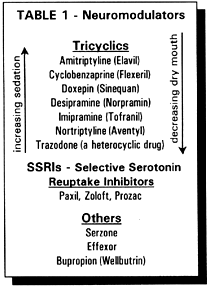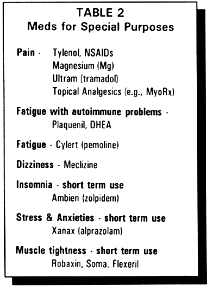

Rheumatologist Philip Mease, M.D., is the medical consultant for
the Comprehensive Care Center in Seattle, a multidisciplinary group that
provides treatments for FMS and CFS patients. At the Seattle conference,
he spoke about drug therapy options for people with these conditions. Mease
discussed treatments that have been researched and shown to be helpful as
well as other therapies that he has found useful in his practice.
Mease's philosophy on treatment is that he is not providing patients with
a cure. Instead, he suggests the idea that FMS and CFS represent a situation
where a variety of regulatory neurochemicals have gone off kilter. This
includes neurotransmitters, hormones and, in some cases, immunomodulating
substances. "What we are trying to do with treatment," says Mease,
"is bring the body back to center, bring it back to neutral."
Some of the therapies he prescribes may help re-regulate your body's natural
chemical systems, while others may simply assist you by reducing troublesome
symptoms.


Most of the medications prescribed for muscle pain, sleep disturbances
and fatigue are in a broad category of neuromodulators, In other words,
they are drugs that alter the functioning of your neurotransmitters, especially
serotonin and norepinephrine. Table 1 lists neuromodulators that are often
prescribed for FMS and CFS, with tricyclics and trazodone at the top. All
the drugs in Table 1 are given in low doses. Still, some patients
may not receive benefits from them or they might not be able to tolerate
their side effects. Typical side effects include excessive sedation, feeling
weird, having nightmares, dry mouth and urinary retention.
If you have tried two or three of the tricyclics at low doses and they don't
work, Mease recommends asking your doctor to let you try some of the other
drugs on the list. They are more activating (i.e., not as sedating) and
many of them are actually taken during the day. This can be good if you
are fighting lots of daytime pain and fatigue, but they may not help with
nighttime sleep.
If fatigue is a big issue, then Mease will often use a combination of a
bedtime tricyclic or trazodone, and a morning medication such as Prozac,
Zoloft or Paxil. These latter drugs tend to be more activating which can
help combat problems of fatigue. Serzone, Effexor and Wellbutrin can also
be tried.
Finding treatments that work can seem to you like a trial and error process,
but you shouldn't give up and neither should your physician. Most patients
do discover therapies (both drug and non-drug) that help them! Mease sums
up this hunt for useful therapies by saying: Be creative in trying different
combinations of drugs, at different doses and at different times during
the day."
Table 2 lists several drugs that may be used to treat various
symptoms. Some of these medications you may not have tried and might not
want to unless you experience the problem indicated for it. But, if you
do battle some of the symptoms listed and you have never been prescribed
these meds, talk to your physician.
Many of the "neuromodulatory" drugs described previously will
work on your pain, fatigue and sleep disruption. However, sometimes they
may not be as effective as you would like. Or, you may have brief periods
in which a particular symptom is extremely bothersome and you may get relief
by temporarily adding another drug to your treatment regimen. Examples of
this situation might include an unusually stressful time at work, a week
in which you haven't been able to get to sleep or the last two or three
days of your menstrual cycle.
Helpful information provided by Dr. Mease about some of the medications
listed in Table 2 is given below:
NSAIDs - Ibuprofen and naproxen (Aleve) are available over-the-counter.
Other NSAIDs may also be prescribed. Ordinarily, these medications are used
to fight inflammation, a problem that isn't usually present in FMS or CFS.
However, Mease recommends that patients in pain give NSAIDs a try because
they also have some pain fighting (analgesic) capabilities. If you find
an NSAID to be beneficial, you should be on the alert for stomach upset
and you should have your doctor order a kidney function test each year (it's
a cheap blood test).
Magnesium (Mg) - 1. Jon Russell, M.D.,Ph.D., of San Antonio, TX,
has shown that Mg coupled with malic acid (a compound that enters your cells
to help make energy) can be helpful for reducing muscle pain and muscle
fatigue. (Russell claims that the addition of vitamin B I and B6 may also
improve the effectiveness of this supplementation process.) If you wish
to try Mg supplementation), Mease says the typical dose would be 400 mgs
twice per day. If you want to purchase a pre-formulated Mg-malic acid vitamin
B 1 + B6 supplement, it can be ordered from ToYour Health by calling (800)
801-1406.
Ultram - This drug is approved by the FDA as a non-scheduled pain
killer. It works primarily on serotonin and norepinephrine receptors, with
a mild action on the body's opioid receptors. Ultram can cause side effects
similar to codeine, which include nausea, headache, dizziness and light-headedness.
According to Mease, "You can usually get around these side effects
if you start out at at very low dose and gradually increase dosage over
several weeks." For more details on Ultram, see the October '95 issue
of FM Network.
Topical Analgesics - Patients may experience a reduction of muscle
pain with application of topical analgesic creams, of which there are many
over-the-counter preparations. There have been no controlled studies of
these compounds in FMS, but numerous anecdotal reports from Mease's patients
indicate that they may be beneficial. According to Mease, an effective new
topical compound is MyoRx cream. Its formulation contains omega 3 and omega
6 fatty acids which are derived from fish and botanical oils. These substances
have been shown to be anti-inflammatory in a variety of conditions. Myorex
can be ordered by calling (800) 606-9679.
Plaquenil (hydroxychloroquine) - This is used to treat various autoimmune
diseases like lupus and rheumatoid arthritis. Plaquenil is related to a
compound called chloroquine that is used to treat malaria. It is a mild
medicine with immune system modulating properties. Mease occasionally pre-scribes
Plaquenil to FMS/CFS patients who have overlapping features of people with
autoimmune diseases (including a high ANA test and symptoms of Sjogren's
syndrome, lupus and others), which are often accompanied by extreme fatigue.
In FMS/CFS patients with an autoimmune prbblem, Mease has noticed that Plaquenil
can sometimes help the FMS/CFS symptoms. This drug can cause toxicities
in the retina of the eye in rare instances. For this reason, people who
take Plaquenil should have an opthomology exam every six months.
DHEA - This is a hormone that is naturally produced by your adrenal
gland and it is a cousin of testosterone. DHEA captured the attention of
rheumatologists in 1992 when reports from Stanford University indicated
that this hormone could significantly decrease joint pain and fatigue in
patients with lupus. Like Plaquenil, Mease tends to prescribe this hormone
in patients who have autoimmune flavor to their symptoms. Although DHEA
has not been studied in FMS/CFS, he has heard anecdotal reports from his
patients that this hormone supplementation can be helpful for reducing pain,
fatigue and mental cognitive cobwebs. Additional information on DHEA appears
in the October '95 issue of FM Network.
Cylert (pemoline) - This drug is used to treat a sleep disorder called
narcolepsy, a condition in which people literally fall asleep mid-day while
sitting up. Naturally, this is a very activating compound and many patients
with FMS/CFS might find it to be too stimulating. The smallest dose of Cylert
is 18.75 mgs. Mease recommends that patients start out by splitting it in
half (or maybe in quarters). One interesting point is that Cylert has been
shown in studies to help fatigue and mental concentration in patients with
multiple sclerosis, lupus and CFS. However, Mease says Cylert can be too
"speedy" for some FMS/CFS patients and he recommends that the
spouses of patients taking this drug hang onto the credit cards!
Meclizine - This is an antihistamine that is sometimes helpful for
treating symptoms of dizziness. "One drawback of this medication is
that some people feel fatigued," says Mease, "but for others it
can be a real help."
During the last year we have reported on tilt table testing of pediatric
patients with CFS by a cardiology team (Peter Rowe, M.D. and Hugh
Calkins, M.D.) at Johns Hopkins as well as the study done on adult FMS
and CFS patients by Daniel Clauw, M.D., at Georgetown. The Hopkins
team has uncovered a fainting problem that they call neurally mediated hypotension
(NMH). Clauw refers to this same phenomenon as dysautonomia because it relates
to a dysfunction or miscommunication between the cardiovascular system and
the auto-nomic nervous system in the brain.
So what is a tilt table test and how can it show whether you have NMH? A
person is strapped into a table and turned 70 degrees so that their legs
are close to the ground but not touching it. "When your feet touch
the ground," says Mease, "your autonomic nervous system sends
signals to your brain to let it know that you are standing in an upright
position. This tells your brain to do all the things necessary to auto-regulate
your blood pressure so that an adequate amount of blood flows to your brain
and it doesn't all drain to your feet."On a tilt table," explains
Mease, "you don't get these important impulses to the brain and, if
you have NMH, you will have trouble regulating the autonomic tone of your
blood vessels (i.e., so that they constrict to send enough blood to your
brain). If your blood pressure drops significantly, it may be a sign of
NMH or dysautonomia."
The Johns Hopkins team has suggested three ways to treat NMH: (1) increasing
salt intake, (2) prescribing a beta-blocker drug called atenolol and (3)
prescribing an adrenal steroid called Florinef (fludrocortisone). The salt
simply increases bloodpressure. Atenolol blocks the effects of epinephrine
(adrenaline) which may surge uncontrollably in NMH and cause the heart contractions
to become erratic. Florinef acts on the kidneys to help them retain more
sodium. It does this by making the kidneys excrete potasium into the urine
in place of sodium, so it is important to take adequate amounts of potassium
and drink lots of water when on Florinef. Although Florinef is a steroid,
it has none of the anti-inflammatory properties of cortisone or prednisone,
nor is it a muscle building type of steroid.
What does Mease do when one of his patients wants to try the NMH therapies
which have been shown to help some people with fatigue? "First, I test
drive them on 25 or 50 mgs of atenolol because it is a fairly safe drug,"
says Mease. "if this makes them feel better, then I continue to let
them use this drug. If they don't get much of a response and want to pursue
more aggressive treatments such as Florinef, then I arrange for them to
have a tilt table test. The reason I don't do this in the beginning is because
this test is costly-roughly $600. If the person has an abnormal tilt table
test, then I okay a prescription of Florinef."
Mease doesn't prescribe Florinef right from the start because it is a steroid,
it has more side effects and requires more precautionary measures to be
taken. Mease prefers to prescribe this compound only after a test shows
that it may be helpful.